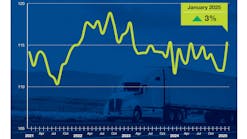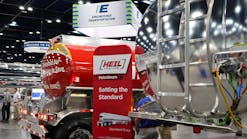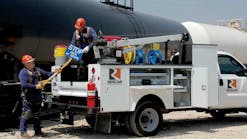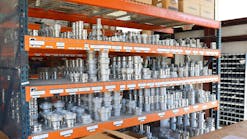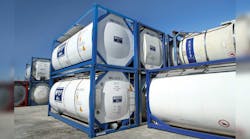LORI Pavlish, who heads Global Supply Chain Environment, Health, and Safety (EHS) and Compliance at The Dow Chemical Company, says she often is asked why companies should participate in Environmental, Health, Safety, & Security (EHS&S) assessments for logistics service providers (LSP).
She said the Intermodal Tank Container Association (ITCA) is a prime example, being that it’s a group for professionals within the shipping container leasing industry to network, share ideas, and keep in touch. Pavlish spoke October 17 during the annual Intermodal Bulk Liquid Symposium, which was sponsored by ITCA’s US members.
“Who are intermodal tank containers leased to? Shippers, many of whom are American Chemistry Council (ACC) Responsible Care (RC) members, the leading companies in the business of chemistry,” she said. “So we have a vested interest in your success and safety.
As ACC RC member companies, we are committed to the ACC Responsible Care Management System (RCMS), including certification. ACC member companies also commit to the ACC Responsible Care Security Code and to transportation safety.”
Pavlish said there are close to one million shipments of hazardous materials occurring daily in the United States, according to data from the US Department of Transportation (DOT). Since 1995, the number of distribution incidents among member companies has declined by 58%.
“Think about how many homes and families are in better shape because of that performance,” she said. “To me, this is staggering datapoint.”
She said the ACC RC member and partner programs drive continuous improvement because both are founded on the Responsible Care Management System, which begins with a strong commitment from company leadership, and is based on effective and proven management practices. The management system combines Responsible Care with the practices of leading private-sector companies, the International Standards Organization and federal regulatory requirements.
A key component of the Responsible Care Management System process is mandatory certification by an independent, accredited auditor. All of the more than 220 companies taking part in Responsible Care in the United States undergo headquarters and facility audits to assure that they have a structure and system in place to measure, manage, and verify performance.
Certification must be renewed every three years, and companies can choose one of two certification options:
• RCMS certification, which verifies that a company has implemented the Responsible Care Management System.
• RC14001, which combines Responsible Care and ISO 14001 certification into a single, cost-effective process.
“One thing I really like about these programs is that they are all driven from the top,” she said. “They really show that your company is committed to running the type of operation that my company as a shipper wants to do business with.”
The ACC Responsible Care Management System requires that commensurate with risk, the organization shall have a process to qualify and periodically review carriers, suppliers, distributors, customers, contractors, and third-party providers based on Responsible Care or other health, safety, security and environmental performance criteria.
“So, how do ACC RC member companies qualify and periodically review LSPs? Our favorite answer: It depends,” she said. “If the LSP operates exclusively in the United States and is eligible to become an ACC RC partner, we encourage their participation and serve as one of their two sponsors, introducing them to fellow ACC RC partner companies and facilitating their progress with the program.”
Pavlish said Responsible Care companies have a worker safety rate five times better than the US manufacturing sector as a whole, and two times better than the business of chemistry overall. They have reduced recordable injury and illness rates by 79% since 1990.
“That’s pretty impressive,” she said. “Think about that. That’s huge.”
Using an Injury Cost Calculator, she said the average direct cost of injury is $38,000 and the average indirect cost of injury is four times the direct cost ($152,000), for a total of $190,000. If the profit margin of the business is 10%, the revenue required to offset the loss is $1.9 million.
“This doesn’t even touch on the environmental impact,” she said. “We all know where that can go. The financial impact of such an incident can be extraordinarily significant.”
She said Safety & Quality Assessment Systems (SQAS) and Chemical Distribution Institute (CDI) LSP assessment schemes fit in.
SQAS is a system to evaluate the quality, safety, security and environmental performance of LSPs and chemical distributors in a uniform manner by single, standardized assessments carried out by independent assessors using a standard questionnaire. CDI is a chemical industry organization, incorporated under the law of the Netherlands as the Stichting Chemical Distribution Institute (CDI) and operates as a non-profit making foundation.
“CDI and SQAS LSP protocols are recognized internationally, and may be preferred by LSPs who operate internationally,” she said. “The LSP works with CDI or SQAS to have their operations assessed by an accredited auditor. The CDI or SQAS auditor provides the LSP with their report; neither CDI nor SQAS provide ‘pass’ or ‘fail’ results to an assessed company. Chemical companies who participate in the CDI and/ or SQAS programs download the LSP’s audit report and score results using the chemical company’s internal criteria. They do not generally conduct their own assessment of the LSP, reducing the number of assessments required of the LSP.
“If I was a logistics service provider, I can guarantee you I’d subscribe to one of these programs,” she said. “I’d take this to my shippers and say, ‘Look folks, take a peek.’ ”
CDI protocols cover CDI-Terminals, CDI-Marine, and CDI-IMPCAS (tank container operator, container freight station, ship agent, freight forwarder, container port terminal, ship–KPI (key performance indicator) audit, and ship operator-KPI Audit. SQAS covers core management systems, transport service, tank cleaning, warehouse, rail, and European Single Assessment Document (specific to chlorinated organics, foodgrade, etc).
SQAS transport service assessments are not available in the United States at this time, but CDI-IMPCAS audits are. ♦


